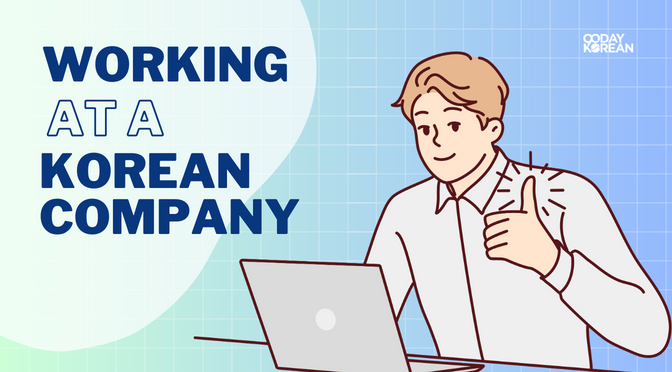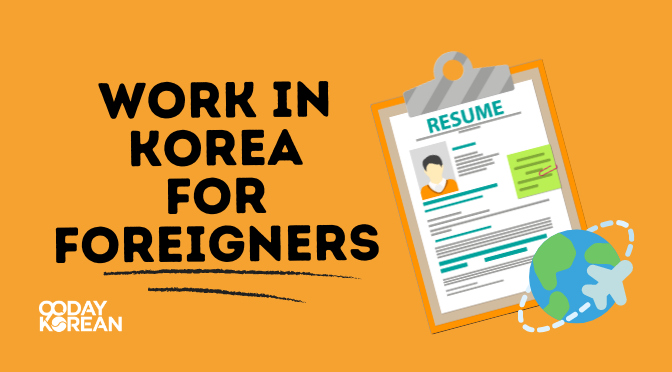Have you ever considered the idea of working at a Korean company? If yes, then one of the things that you should know is that going overtime is normal in Korea.
That’s just one, but we will be sharing a few more important things to know if you’re planning to work in Korea below. Read on!
Quick Summary
Before we go into the lesson, here’s a preview of what you’ll be learning.
✅ Working in a Korean company means you’d most likely have to arrive early and go home late because punctuality and working overtime are deeply ingrained in Korean work culture.
✅ Hanging out with coworkers after work can help you become closer friends outside of work.
✅ If you want to get along well with others at work, learning and adjusting to cultural cues like nunchi and jeong will be very helpful.
Contents
- 1 Quick Summary
- 2 8 important things to know when working in Korea
- 2.1 #01. Don’t be late and get accustomed to working overtime
- 2.2 2. Get ready to spend time with your co-workers after work
- 2.3 3. Personal relationships between co-workers are encouraged
- 2.4 4. Cultural concepts stand strong within Korean companies
- 2.5 5. You will likely get to take part in membership training
- 2.6 6. Remember to use the correct titles in the office
- 2.7 7. You shouldn’t question your superior
- 2.8 #08. The more Korean you speak, the better
- 3 Wrap Up
8 important things to know when working in Korea
It is important to know the following things when you work at a Korean company.
#01. Don’t be late and get accustomed to working overtime
You really do not want to be late even one minute for your job, as that will easily get noticed and thus get you in trouble. In fact, you may want to prefer to show up even 10 minutes early. Additionally, you may already be familiar with the concept that Koreans often tend to stay at work for at least one more hour after their work time has officially ended for the day. So, be prepared to do that!
However, before you get all stressed out, not every company adheres to this unspoken rule. Especially modern, newer companies with younger top personnel don’t consider this a requirement. This doesn’t mean you actually have so much work to do you can’t get out on time.
Instead, you may find yourself taking online courses, planning vacations, reading news, and whatnot while on the clock, just to make the time pass until it’s OK to leave.
Do pay notice, though, that even when it is not required, many Korean employees tend to stay overtime, that’s how deeply ingrained this is in Korean work culture. This overtime notion often comes from the fact that workers feel obligated to stay until their supervisors have also left the office for the day.
Don’t forget to anticipate unpaid overtime and the expectations that come with your first job, as these are common in South Korean work environments. In a few years, you’ll probably get used to the unique aspects of South Korean culture and thrive in your career.
2. Get ready to spend time with your co-workers after work
Besides staying late in the office, it is also incredibly common for co-workers to go out together for food, drinks, and karaoke after work hours. They are often regarded as mandatory to attend for at least one round, although less so at modern companies with younger leaders.
How these after-work dinners are conducted depends entirely on the company and possibly even the team and department within a company. Some teams may go out for these dinners once a week, while for others, it’s more of a special occasion that is held once a month.
Also, with the emergence of newer companies with more modern ways of thinking, some teams may opt to enjoy lunch together instead of dinner and drinks.
3. Personal relationships between co-workers are encouraged
Something that perhaps becomes clear from the previous point already is that in every Korean office, having close interpersonal relationships with your colleagues is a treasured concept.
Within Korean companies, it is believed that trust between employees is one of the most important things, contributing to a strong team player dynamic.
In other words, it may not be possible to keep your work and personal life as separated in Korea as you might be able to do in another country. Building friendships with your colleagues is also one way in which you are showing your commitment to the company and fostering a healthy work-life balance.
However, while these relationships are encouraged, you must still remember to take into account each colleague’s office rank, especially in South Korea. If they rank higher than you, you’ll need to keep in mind the additional layer of respect that comes with it.
4. Cultural concepts stand strong within Korean companies
We’ve already learned about Korean concepts before. This means unspoken concepts that drive behavior patterns, like nunchi, gibun, and jeong. They are strongly present in every Korean’s daily life.
Thus, they also act accordingly in the workplace. This essentially means trying to show oneself to others in a particular light, putting harmony with others above all else, having a high level of situational awareness, and so on.
Many of these cultural concepts are similarly present in other Asian cultures, so it is incredibly important to be aware of them before stepping into the office. Of course, just because you want these concepts to guide your behavior in the workplace doesn’t mean you need to give up your identity or personality to them entirely.
5. You will likely get to take part in membership training
Membership training, MT for short, is one of the major differences in the Korean work culture. It is not something that you come across only at work, as many university clubs arrange these as well.
Basically, you will head over to the mountains or the countryside to stay in a pension (a type of guesthouse) over the weekend. Once there, you’ll do some sports or play games, likely eat barbecued food, and drinking is absolutely a big part of it all.
In other words, there’s not a whole lot of actual training involved; it’s more so a weekend for bonding and experiencing the unique office environment.
6. Remember to use the correct titles in the office
Even if someone is your close friend or has a romantic interest outside of the office, you will not want to use those terms at work.
Instead, always use the correct titles to refer to them, whether that’s -씨 or -님 or something more specific to their position. In general, it is good Korean business etiquette to use these titles to avoid making many mistakes.
7. You shouldn’t question your superior
This may be a conflicting matter to understand and also doesn’t necessarily take place in every company. However, typically in team meetings, your superior will introduce you to a strategy, idea, or concept, and regardless of what you think of it, you shouldn’t disagree with it.
Unlike in Western countries, where challenging a superior’s idea may be a productive and efficient way of working, it is not so in South Korea. This again goes back to concepts such as harmony, which are deeply ingrained in Korean society and work culture.
Besides the team leader, you will also want to be careful about challenging a colleague in the company who has seniority over you. One of the reasons for this is the strong hierarchy within the company, which is a big thing in Korean work culture.
Another one is that your superior likely has another person to report to, from whom they already got approval for this particular strategy.
Thus, it is also the strategy that needs to be presented in the end, whether it worked or not, aligning with the established working environments.
#08. The more Korean you speak, the better
If you are teaching English in Korea, you may be discouraged from communicating in Korean, especially around the students. However, in any other Korean environment, it’s absolutely an advantage to be able to communicate in Korean.
It is a sign of respect towards your colleagues and the country, but you may also have some co-workers who can’t speak English or some other language that you are more comfortable with than Korean.
Knowing and using Korean will make it easier to bond with those around you and navigate the intricacies of Korean culture and the Korean language in the workplace. However, if you have language skills besides Korean, they may also prove to be useful in the long run.
For example, you may be given tasks revolving around that language, which other employees cannot do. This can open up opportunities for learning Korean and improving your working hours and overall experience in the Korean work environment.
Wrap Up
So, that’s the scoop on working for a company in South Korea! Remember, fitting in means understanding how things work. And don’t forget about those cultural customs – they’re a big deal, especially in South Korean culture!
Whether you’re dreaming of joining a K-Pop giant or a big-name company like Samsung, knowing the ropes of Korean corporate culture will help you shine. So, dive in, stay true to yourself, and enjoy the adventure!
With these tips, you’ll be sure to get started on your journey of working in South Korea! Do you think the Korean company life is for you? Next, you may want to learn how to actually get a job in Korea, brush up on business Korean, or study the vocabulary for jobs in Korean.





